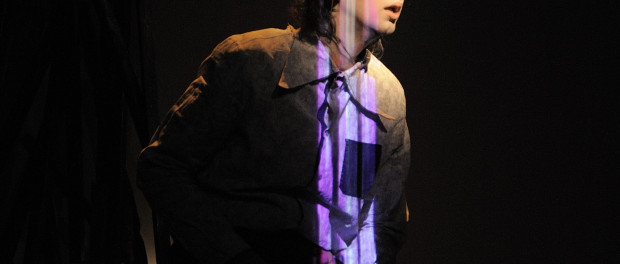Review: Alfred a Metaphor for the Beasts Inside
For more than an hour, a small town tells its own story borrowing the vision of five — or should I say six? — traumatized and borderline individuals who hope to give a sense of renewal to their empty, meaningless and constrained lives in the play Alfred. Freedom comes precisely at hand when Clyde Redding, a disturbed yet benevolent zoo keeper releases the big cats and irremediably brings chaos upon the quiet, oh too quiet, town of Akron, Ohio. The extraordinary event also serves the unintended purpose of unchaining the repressed souls of a sullen America, crushed by its own fallen dream.
Emmanuel Schwartz delivers an astonishing performance in performing the roles of all six characters, starting from Alfred. Alfred Mc Moore existed; he was in charge of safety at the Akron zoo, but decided to free the animals and was later diagnosed schizophrenic. After reading the true story of Mr Mc Moore, Schwartz and stage director Alexia Buger developed an indea in which the multi-facial Schwartz empowered himself to give a voice to the dropouts of the New World. All six characters embody a troubled part of America; they all participate in drawing the portrait of types, of the dysfunctional land we have come to know as the land of freedom, and also the land of crime.
Havoc is wreaked upon Akron when the beasts are broken free. Each and every singular animal aims to express itself, but the only truth coming out from all the chaos and disorder is fear.
The play is full of subtle symbols; when animals invade public space, the inhabitants lose control and one wonders who is more bestial and who is more tamed of the two. Two Biblical myths revolve around the notions of freedom and power, alluding to the compelling notion of salvation anchored in the Puritan origins of the country. The Tower of Babel is recreated when neither animals nor humans understand their own languages, even when sharing the same langauge. They are hindered by their own individuality and it all splits into nothingness. Noah’s Ark is set on the stage with only a few survivors from their own massacre, unable to save the Earth, lost to a frenzied state. An Apocalyptic era commences with bloodsheds at its apex.
The sole actor onstage jumps from one character to another with such delicacy that the audience ends up guessing who this is before the totally offhand Schwartz makes a sound. A former drug addict in search for identity ends up acting like a Christian, moved by sudden divine guidance within the Akron Bank in state of total shock, flooded by demonic money withdrawals. In the wink of the eye, no more, no less, he became a shy primary school teacher who never knows what she really means. The maiden’s leap to freedom on the dance floor is cut short when she is raped on her way back home. Then, we have a special invitation into the home of a secluded old man. He leaves both his telephone rings unanswered and his doors open, resigned that he is to to wait for the only visitor he’s truly wanted for the last thirty years: a flamingo. Gunshots are associated with the muffled cries of a traumatized warrior who is compelled to shoot monkeys in order to make the country pround. Of course, there is Clyde who starts it all, transfigured into Alfred, the panther he sets free, the panther who understands him, the panther who sets him free. In their tacit dialogue, Schwartz shines a human light within the eye of the beast eye and, most worryingly, there shines something bestial within the heart of the man.
Schwartz’s fable inquires about the best ways to find oneself, while taking into account our own irregularities, our lack of compassion and our excess of violence, fear and even freedom.
Alfred runs until May 4 at Théâtre d’Aujourd’hui (3900 St. Denis). Tues 7 p.m., Wed-Sat 8 p.m., Sun 3 p.m. Check website for prices.
1 Comment on Review: Alfred a Metaphor for the Beasts Inside
Comments are closed.








test test test test